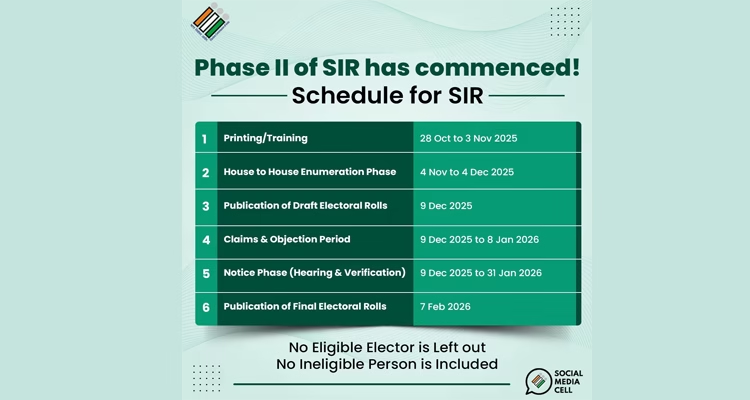
New Delhi: The Election Commission of India (EC) rolled out the second phase of its Special Intensive Revision (SIR) of electoral rolls, a massive voter verification exercise covering nine states and three Union territories with a combined electorate of nearly 51 crore voters.
The drive, which began with the enumeration stage today, will continue till December 4, followed by the release of draft electoral rolls on December 9. The final voter list will be published on February 7, 2026, marking the culmination of the exercise.
Enumeration Form distribution is in full swing across #WestBengal pic.twitter.com/dPlIHGL2VW
— Election Commission of India (@ECISVEEP) November 4, 2025
This phase follows the successful completion of the SIR in Bihar, where the updated electoral roll with 7.42 crore registered voters was published on September 30.
The second-round revision spans the Andaman and Nicobar Islands, Lakshadweep, Chhattisgarh, Goa, Gujarat, Kerala, Madhya Pradesh, Puducherry, Rajasthan, Tamil Nadu, Uttar Pradesh, and West Bengal. Among these, Tamil Nadu, Puducherry, Kerala, and West Bengal are slated for Assembly elections in 2026.
Assam, which is also due for polls that year, has been excluded from this round because of a Supreme Court-supervised verification of citizenship records under the Citizenship Act.
According to the Election Commission, the SIR aims to cleanse and update the electoral database, ensuring that no eligible voter is left out and ineligible names—including illegal migrants—are removed. Officials said the process includes verification of voters’ place of birth, which will aid in identifying non-citizens, especially amid ongoing actions against illegal immigrants from Bangladesh and Myanmar.
This marks the ninth major revision of electoral rolls since Independence, with the last comprehensive revision undertaken between 2002 and 2004.
The EC said the large-scale exercise reflects its commitment to maintaining a transparent, inclusive, and credible electoral process, ahead of key state polls and the 2026 general revision cycle.



